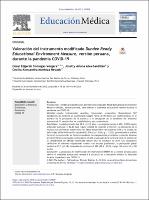Valoración del instrumento modificado Dundee Ready Educational Environment Measure, versión peruana, durante la pandemia COVID-19
Related Resource(s)
https://www.sciencedirect.com/science/article/pii/S1575181323000190Date
2023-05-01Author(s)
Sisniegas-Vergara, César Edgardo
Alva-Santillan, Josetty Ariana
Monteza Nevado, Cecilia Alessandra
Metadata
Show full item recordAlternate title
Assessment of the Dundee Ready Educational Environment Measure instrument modified from the peruvian version during COVID-19 pandemic
Abstract
Introducción: validar una modificación del instrumento Dundee Ready Educational Environment
Measure (DREEM), versión peruana, para evaluar el ambiente educacional remoto durante la
pandemia por COVID-19.
Métodos: estudio instrumental, analítico, transversal, prospectivo. Respondieron 527
estudiantes de Medicina un cuestionario Google Forms de 50 ítems con modificaciones en el
dominio de la percepción de la docencia y la percepción de la atmósfera del ambiente
educacional. El muestro fue no probabilístico y por conveniencia.
Resultados: la edad promedio fue 20,4 (±2,74) años. Las mujeres fueron el 63%. El 88% usaron
ordenador personal. El 62,6% tuvo regular calidad de conexión a Internet. La adecuación de la
muestra fue pertinente (coeficiente de Kaiser-Meyer-Olkin de muestreo 0,96 y la prueba de
esfericidad de Bartlett con Chi-cuadrado 13.976,1; p < 0,05 y g.l. 1.225), garantizando el análisis
factorial. La extracción de factores mediante los componentes principales y rotación Varimax
arrojó 10 factores primarios explicando el 62,54% acumulado de la variancia total. El análisis de
la confiabilidad del DREEM modificado obtuvo alfa de Cronbach de 0,95. Los estudiantes
calificaron el ambiente educacional remoto «con muchos problemas», la puntuación global
media fue 87,7 (±1,18), intervalo de confianza al 95% (85,4 - 89,9), rango 134 entre 24 y 158
puntos
Conclusión: la propuesta de modificación del instrumento DREEM de la versión peruana para
valorar el ambiente educacional remoto o a distancia en la educación médica es adecuado
durante la pandemia por COVID-19. Introduction: To validate a modification of the Peruvian version of the Dundee Ready
Educational Environment Measure (DREEM) instrument to assess the distance learning
environment during the COVID-19 pandemic.
Methods: Instrumental, analytical, cross-sectional, prospective study. A 50-item Google Forms
questionnaire was applied to 527 medical students with modifications in the domain of
perception of teaching (02) and perception of the atmosphere of the educational environment
(03). The sampling was non-probabilistic and by convenience.
Results: The average age of the students was 20.4 (±2.74) years. 63% were women, 88% used a
personal computer and 62.6% described the quality of their Internet connection as regular. The
adequacy of the sample was pertinent (Kaiser-Meyer-Olkin sampling coefficient 0.96 and
Bartlett's sphericity test with Chi-square 13,976.1; p < 0.05 and df 1,225). The extraction of
factors through the analysis of the main components and Varimax rotation, yielded 10 primary
factors that explain the accumulated 62.54% of the total variance. The reliability analysis had
Cronbach's alpha of 0.95. This result is considered to be very adequate. The students rated the
remote educational environment "with many problems", the mean global score was 87.7 (±1.18),
with a confidence interval of 95% (85.4 - 89.9), range 134 between 24 and 158 points.
Conclusion: The proposal to modify the DREEM instrument of the Peruvian version to assess the
remote or distance educational environment in medical education is adequate during the COVID19 pandemic.






